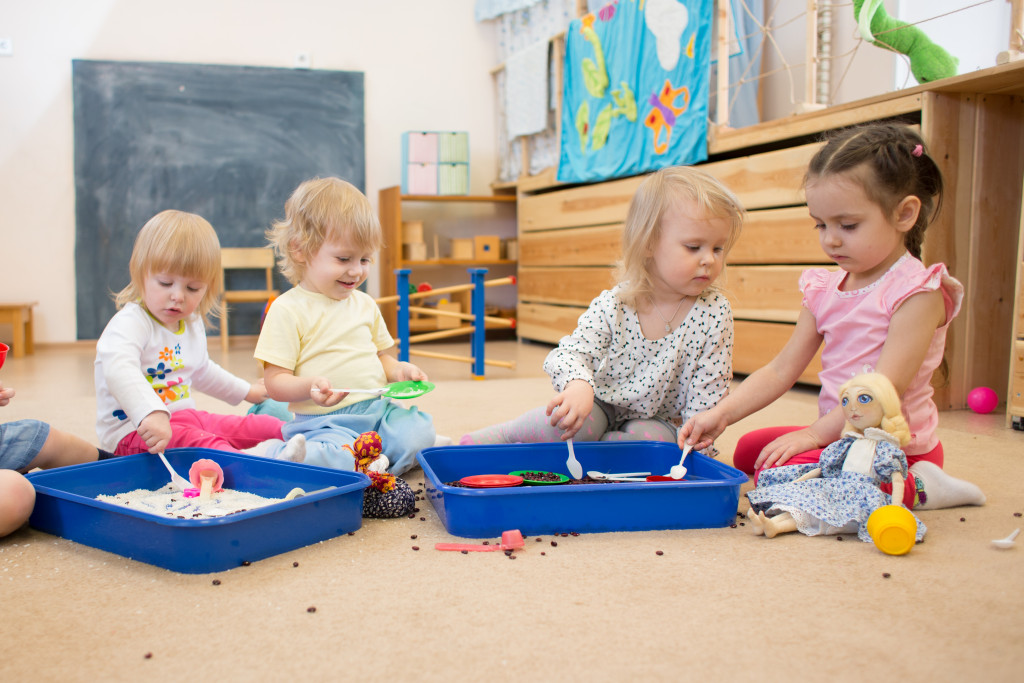- Be a role model and demonstrate positive behaviors to your child.
- Organize playdates to provide a controlled environment for socialization practice.
- Encourage group activities to teach the value of teamwork and collaboration.
- Foster emotional intelligence by teaching vocabulary, validating feelings, and practicing emotional regulation.
- Consider enrolling your child in a summer camp for an enriching experience.
Strong social skills are more important than ever in today’s interconnected world. It’s about making friends, understanding and navigating complex social situations, building empathetic relationships, and effectively communicating with peers. As a parent, you naturally want your child to grow into a socially adept individual. Here are five actionable strategies to foster these essential skills in your child.
1. Be a Role Model
Children often mirror the behaviors they observe, especially from those they look up to. Your interactions with others, both in and outside the family, set the stage for how your child perceives social interactions. Demonstrating active listening, displaying empathy, and maintaining open communication are crucial. When they see you interacting harmoniously with others, they’re more likely to emulate those positive behaviors.
Additionally, how you address conflicts or disagreements is equally significant. Show them that it’s possible to have differing opinions while still maintaining respect and understanding. This helps them navigate similar situations in their peer interactions.
2. Organize Playdates

Organizing playdates with kids of the same age group can be an effective way to encourage social interactions. These gatherings provide a controlled environment where your child can practice their social skills. It’s essential, however, to ensure that these playdates are not overly structured. Letting kids play freely allows them to navigate their relationships, develop their imaginations, and solve conflicts independently.
While it might be tempting to intervene at the first sign of disagreement, give them a chance to resolve issues independently. This not only boosts their confidence but also teaches them important problem-solving skills.
3. Encourage Group Activities
Team sports, dance classes, or even group art sessions offer a fantastic opportunity for kids to socialize. Not only do these activities teach children the importance of teamwork and cooperation, but they also expose them to different personalities and temperaments.
Such experiences can teach them patience, understanding, and the value of collaboration. They learn firsthand that everyone brings a unique strength and that achieving a common goal often requires collective effort and understanding.
4. Foster Emotional Intelligence
Understanding and managing one’s emotions is a significant aspect of socialization. Teaching them that it’s okay to feel a range of emotions and equipping them with the tools to manage these feelings can lead to more fulfilling and empathetic interactions with their peers.
Here are some tips for fostering emotional intelligence:
Teach Emotional Vocabulary
Equip your child with an emotional vocabulary. Start with emotions such as happy, sad, angry, and scared. Introduce more complex emotions like disappointment, frustration, and excitement as your child ages. Encouraging your child to label their feelings helps them better understand and communicate their emotions. It also aids in empathetically recognizing emotions in others.
Validate Their Feelings
Valuing your child’s feelings is essential, regardless of how trivial they may seem. When your child expresses emotion, acknowledge it. Say, “I can see you’re upset because your toy broke,” or “You’re really excited about the school fair.” This validation teaches them that emotions are a natural response to situations and that feeling and expressing them is okay.
Practice Emotional Regulation
Teaching your child to manage their emotions is vital for their emotional intelligence. This can start with simple breathing exercises when they feel overwhelmed or anxious. You could also teach them to take a step back, consider why they’re feeling a certain way and consider appropriate ways to express those feelings. This helps them gain control over their reactions and responses.
Model Empathy

Children learn empathy by seeing it in action. Show empathy towards your child and others around them. Express understanding and compassion when they are in emotional distress. Also, discuss how others may feel in various situations, encouraging your child to step into someone else’s shoes. This understanding and respect for others’ feelings form the basis of strong, empathetic interpersonal relationships.
5. Consider Enrolling in a Summer Camp
Attending a fun summer camp is one of the most enriching experiences for developing a child’s social skills. Away from the comforts of home, children are nudged out of their comfort zones. They meet kids from diverse backgrounds, participate in group activities, share living spaces, and navigate minor disputes—all under the guidance of trained counselors.
Summer camps offer a unique blend of fun and learning. Whether collaborating on a camp project, sitting around a campfire, or sharing stories under the stars, the memories and social skills acquired here can last a lifetime.
In Closing
Fostering social skills in your child is a journey, not a destination. It requires patience, understanding, and consistent effort. Remember that every child is unique, and their social development might differ from their peers. Celebrate their small victories, provide guidance when they falter, and always ensure they know they’re loved and valued. With your support, they’ll grow into socially adept and confident individuals.




